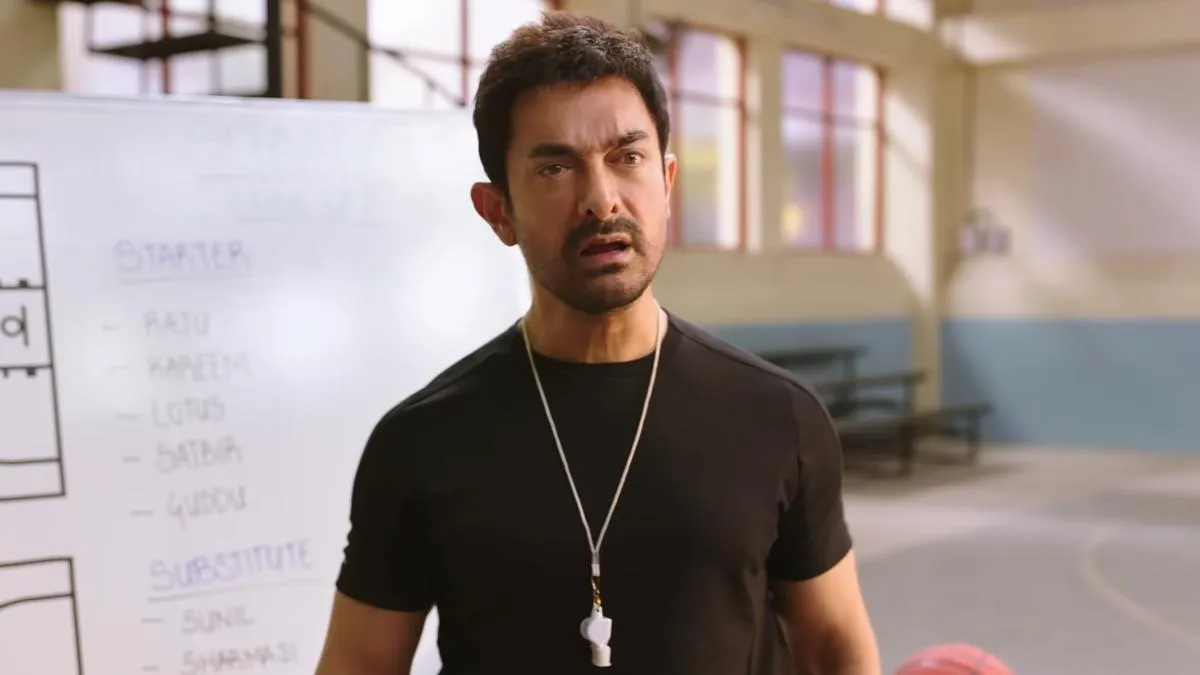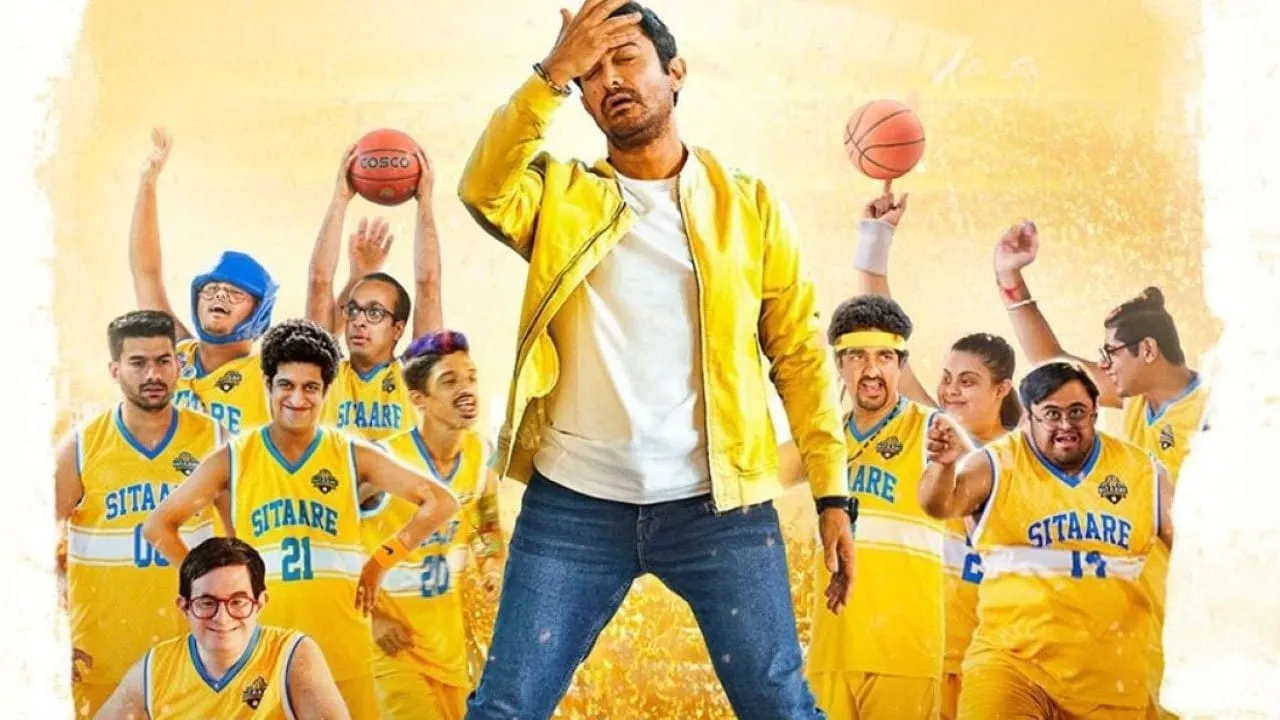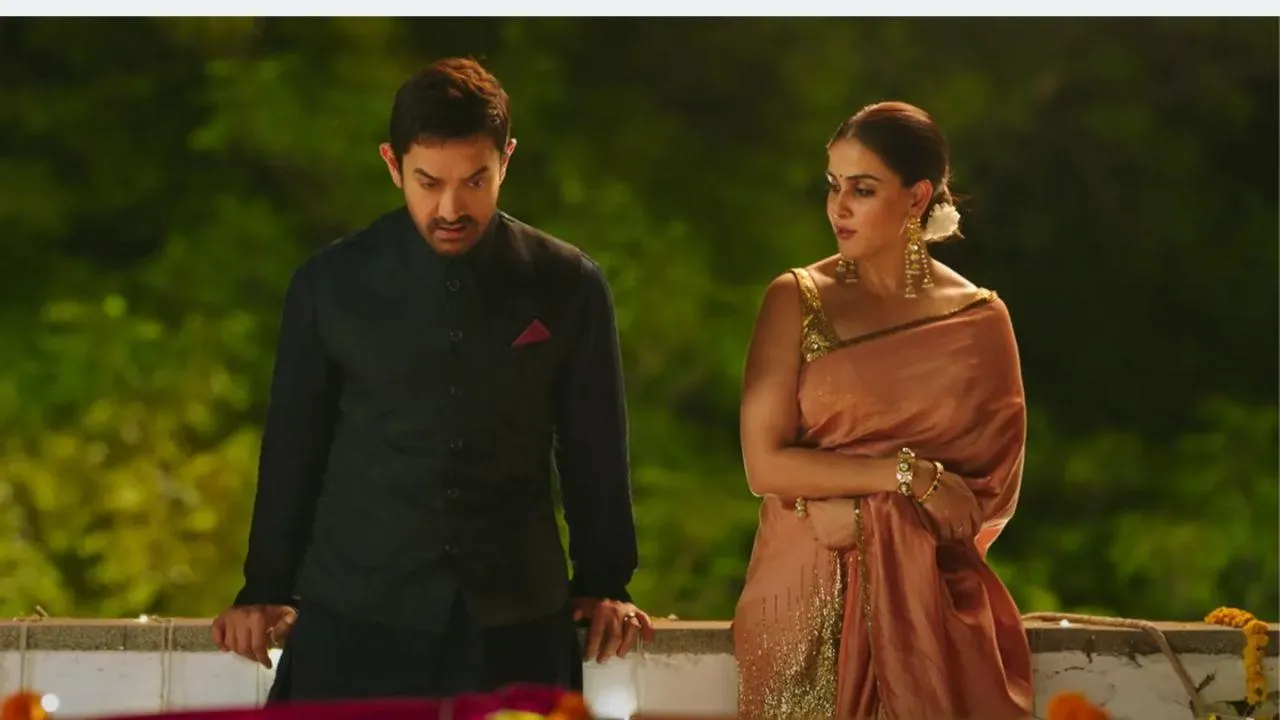Talent curdled by ego is a familiar sight in sports cinema, and Gulshan Arora is a pitch-perfect embodiment. A gifted basketball coach in the Indian circuit, his career implodes when his fiery temper leads him to strike a senior, resulting in his suspension.
The downward spiral accelerates with a drunk driving charge that lands him before a judge. Instead of a jail cell, Gulshan receives an unconventional sentence: community service. He must coach “The Winners,” a local basketball team composed of spirited young adults with intellectual disabilities.
For the cynical Gulshan, this is a profound humiliation, a punishment to be endured. He views the team with annoyance, not empathy. The film immediately frames itself as a thematic successor to the landmark Taare Zameen Par (2007).
Yet, it executes a deliberate narrative reversal. Nearly two decades after Aamir Khan played the compassionate teacher unlocking a child’s potential, here he is the flawed student. The film signals a shift, suggesting the journey of understanding neurodivergence in Hindi cinema is no longer solely about a savior figure, but about the profound education the supposed teacher receives from his pupils.
The Unlearning of a Bollywood Hero
Aamir Khan’s Gulshan is a character steeped in a particularly North Indian brand of masculine insecurity. More than just a coach with an attitude problem, his arrogance is a shield for his complexes—a sensitivity about his short stature and a deep-seated fear of fatherhood rooted in his own family history.
He is deliberately unlikable, a portrait of a man whose professional talent is soured by personal bitterness, making his mandated journey into the world of special needs feel like a cruel joke at his expense.
His initial reaction to the team is a raw reflection of societal prejudice, casually deploying the loaded term ‘paagal’ (mad) to dismiss individuals he refuses to see. His coaching methods, built on aggression and discipline, are useless here. He is a man speaking a language no one understands, his frustration mounting with each failed drill.
The film wisely avoids a single moment of epiphany. Instead, Gulshan’s hardened exterior is eroded through a series of small, authentic interactions. The turning point is not one event but a process; the players, with their unabashed spirit and resilience, begin to “coach” him in empathy and patience.
His journey becomes the film’s emotional backbone. He doesn’t just teach them basketball; he unlearns a lifetime of cynicism. His definition of victory shifts from the scoreboard to a shared moment of joy. Khan weaponizes his star power to portray this unlikability with conviction.
For an actor who has built a career on playing saviors, this role is a fascinating act of self-subversion. His performance is physical and precise; the arched eyebrows and dismissive hand gestures—initial tics of arrogance—slowly dissolve, replaced by a quiet watchfulness and an open-hearted warmth that feels entirely earned.
Beyond the Diagnosis: A Team of Individuals
Where the film truly transcends the conventions of the sports-redemption genre is in the portrayal of the team itself. They are the titular “sitaare” (stars), and the narrative treats them not as a collective problem to be solved but as a vibrant mosaic of individuals.
The story takes pains to define them by their personalities, dreams, and histories rather than their diagnoses, presenting them as spirited and resilient people who refuse to be objects of pity. The script succeeds by grounding their characters in specific, tangible details that make them feel alive.
There is Golu (Simran Mangeshkar), the team’s fiery lone girl whose first line of defense is a swift kick; Guddu (GopiKrishnan K Verma), whose deep-seated aquaphobia is a tangible piece of his past trauma; and Bantu (Vedant Sharma), whose repetitive ear-scratching is presented not as a mere quirk but as a visible manifestation of his inner state.
The film also attempts to show the breadth of the neurodivergent spectrum through characters like Hargovind (Naman Misra), who represents high-functioning, “invisible” autism, and Lotus (Aayush Bhansali), a dye-factory worker whose ever-changing hair color is a quiet explosion of self-expression.
The film’s most significant creative choice, aligning it with a progressive global movement towards authentic representation, is the casting of neurodivergent actors. This decision infuses their performances with an unscripted vitality and a palpable joy that manufactured acting could never replicate.
It moves the depiction beyond mere imitation into the realm of genuine expression, offering a powerful counter-narrative to the long history of able-bodied actors playing disabled roles in both Hollywood and Hindi cinema.
Ultimately, “The Winners” are far more than a plot device for the coach’s salvation. They are the film’s moral and emotional compass. Their narrative function is to dismantle Gulshan’s cynical, success-driven worldview and replace it with something more humane. They teach him that worth is not measured in trophies or social conformity, but in acceptance, joy, and profound human connection.
A Philosophy of Joy
At its heart, the film champions a simple yet profound philosophy encapsulated in its tagline: “Sabka apna apna normal hai”—everyone has their own normal. It is a deliberate mission statement, shifting the cinematic conversation around disability away from the well-worn tropes of pity and towards a more radical, joyful acceptance.
In a global landscape where social issues are often explored through gritty realism, the film makes a different choice. It aligns itself with the feel-good message movie, using a lighthearted, humorous tone to disarm prejudice and make its philosophy accessible to the widest possible audience.
The film employs a narrative strategy of radical sincerity, choosing to state its themes with unambiguous clarity. It does not bury its message in subtext; characters often articulate it directly, as when one explains that their destiny is written in their chromosomes, not on the palms of their hands.
This on-the-nose approach is a classic technique in popular Hindi cinema, prioritizing the social message’s impact over narrative subtlety. This directness is softened by a skillful blend of humor and sentiment.
The comedy is organic, stemming from the wonderfully authentic interactions between the rigid coach and his irreverent team. By making audiences laugh with its characters first, the film forges a powerful bond of affection that makes the later, more emotional moments feel earned and deeply resonant.
Crafting a Compassionate Tone
Director R. S. Prasanna steers the film with a generous, humane touch, ensuring the tone remains consistently sweet even when navigating its protagonist’s initial bitterness. His direction prioritizes emotional warmth over cinematic grit.
However, the narrative rhythm is less steady. The script, while containing moments of sharp, witty dialogue, struggles with an inconsistent pace, particularly in a slow-moving first half that takes its time setting up the central conflict.
This leisurely feel is amplified by narrative detours, like an entertaining but distracting subplot involving Gulshan’s mother. This comedic sidebar, a classic feature of mainstream Hindi cinema, offers broad appeal but pulls focus from the core emotional journey.
The film’s musical landscape mirrors this duality. The title track from the celebrated trio Shankar Ehsaan Loy is a burst of effervescent energy that perfectly captures the team’s infectious spirit. In contrast, Ram Sampath’s background score often proves heavy-handed, explicitly underlining emotional beats the actors have already conveyed. This practice of using music to direct audience feeling is common in popular Indian cinema, but here it occasionally mistrusts the power of its own quiet, heartfelt moments.
Anchors in the World Outside
Beyond the basketball court, Gulshan’s world is populated by characters who represent the life he has broken and the moral compass he has lost. Genelia Deshmukh, as his wife Suneeta, serves as the primary casualty of his ego.
While her character feels underdeveloped—a familiar pitfall in hero-centric Indian narratives—she provides a crucial emotional barometer for his failings, especially in their conflict over starting a family, a theme with particular weight in this cultural context. She is the life he must earn his way back to.
In contrast, Dolly Ahluwalia Tewari’s Preeto is a wonderfully realized portrait of the quintessential Delhi mother—a blend of unconditional love and sharp-tongued exasperation. Her role transcends that of a simple support system; her own subplot, involving a late-in-life companionship with the family butler Daulatji (a charming Brijendra Kala), serves as a gentle echo of the film’s core message about finding one’s own “normal” at any age.
Rounding out this world is Gurpal Singh as the center’s benevolent manager, a figure who functions as the film’s calm, moral guidepost, articulating the philosophies that Gulshan must learn through messy, lived experience.
Sitaare Zameen Par premiered in Indian cinemas on 20 June 2025, and has been praised for blending humor, empathy, and social awareness.
Full Credits
Director: R. S. Prasanna
Writers: Divy Nidhi Sharma, David Marqués (original story)
Producers and Executive Producers: Aamir Khan, Aparna Purohit
Cast: Aamir Khan, Genelia D’Souza
Director of Photography (Cinematography): G. Srinivas Reddy
Editors: Charu Shree Roy
Composer: Ram Sampath (score); Shankar–Ehsaan–Loy (songs)
The Review
Sitaare Zameen Par
Sitaare Zameen Par succeeds on the sheer force of its heart. Propelled by the wonderfully authentic and joyous performances of its neurodivergent cast, the film is a charming and effective vehicle for a powerful message of acceptance. While its emotional impact is occasionally blunted by a formulaic script, inconsistent pacing, and a heavy-handed score, the film's genuine warmth and Aamir Khan's committed performance as the flawed coach make it a journey worth taking. It’s a film that scores higher on spirit than on subtlety, leaving you with a smile.
PROS
- A powerful, positive message of inclusivity and acceptance.
- Authentic, scene-stealing performances from the ensemble cast of neurodivergent actors.
- Aamir Khan delivers a convincing transformation from a cynical coach to a caring mentor.
- Genuinely funny and heartwarming character interactions.
CONS
- The narrative pacing is inconsistent, with a noticeably slow first half.
- The script often states its themes too directly, lacking subtlety.
- Key supporting characters feel underdeveloped and some subplots are distracting.
- The background score can be overly sentimental and emotionally manipulative.




















































